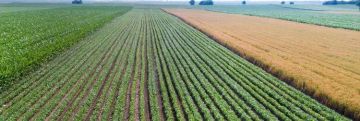
Module content will review crop production techniques that maintain and enhance soil organic matter and lead to carbon sequestration including crop associations and rotations. Conversion to organic crop production will be described and discussed. Plant nutrition requirements will be studied including the role of macronutrients and micronutrients to improve plant health and resilience to different diseases and pests. IPM strategies to reduce disease and pest pressures, enhance sustainable crop production and profitability will be presented and evaluated. The role of new and emerging gene editing technologies will be reviewed and their relevance to organic and biological agriculture appraised. The overarching objective of this course is for graduates to understand the inter-relationship between achieving balanced plant nutrition and development for climate resilient and profitable crop production.
- Crop and forage establishment and management practices to maintain soil health e.g. conservation agriculture.
- Managing the transition from conventional practice to organic and biological systems of production.
- Beneficial crop and plant interactions – crop associations, rotations, combi-cropping, inter-cropping and relay cropping.
- Integrating diverse cover crops and maintaining crop residue covers to improve nutrient cycling and recycling in soils.
- Plant nutrition – macro and micro nutrient interactions necessary for optimum plant health status.
- Integrated pest management strategies to maintain plant health and resilience to pests and diseases.
- Sustainable use of bio-pesticides, biotechnology, novel crops, and plant protection products for sustainable crop production.
- Policy and regulation related to organic crop production in the F2F Strategy, the CAP, and the Programme for Climate Action.
Discounted / Part-Funded Places Through NOTS:
Eligible participants in Ireland can avail of a 40% cost reduction on course fees through our MSc course partners National Organic Training Skillnet. Contact NOTS by calling 071 9640688 or email [email protected] for more information on eligibility for these reduced fees.
The module will be delivered in the first semester of each academic year with online lecture sessions each week. Course days will be held during the semester to avail of optimal field conditions for crop assessment and evaluation. Laboratory and field practicals will be held at SETU Waterford Cork Road Campus and the West Campus in Carriganore. Case study assessments and farm audits will be held during the semester at spaced intervals and the final written exam will be held at the end of the semester.
On successful completion of this module, a student will be able to:
- Demonstrate and explain a detailed knowledge of key field management practices in sustainable cropping practices.
- Describe and prepare beneficial crop and plant associations, interactions, and rotations for enhanced output and production.
- Combine different cover crop species and employ plant root interactions to enhance soil biological, chemical and physical processes.
- Assess and evaluate the role of macro and micronutrients from inorganic and organic sources for healthy crop development.
- Analyse and select practices and techniques to improve plant health status and develop biological pest and disease management.
- Critically appraise and evaluate the scientific evidence for the application of gene-edited, modified and novel crop technologies at farm level.
- Assemble, assess and interpret crop research and field trial study findings and analyse and review their application and appropriateness for in-field practice.
Applicants must hold a National Framework of Qualification (NFQ) Level 8 honours degree in Agri-business and Rural Enterprise, Agriculture, Environmental and Land Science, or other Science-related discipline. Offers will be made based on the applicant’s Grade Point Average (GPA). Applicants who hold a Level 8 degree in a non-cognate area may be considered for entry under SETU’s Recognition of Prior Learning (RPL) mechanism and equal weighting will be given for GPA qualifications(50%) and a selection interview(50%) to assess prospective candidate’s aptitude and experience relevant to the certificate programme.
Graduates with the Level 9 Certificate in Crop Management in Organic and Biological Agriculture may wish to apply the knowledge and practices learned in primary commercial production, provide support and technical advice to growers and farmers or may opt to remain in a research, development and innovation environment. They may also use their applied knowledge and skills in public service for the development of supportive agricultural, climate, and environmental policy.
Upon successful completion of other Level 9 Certificates the learner can graduate with a Certificate in Organic and Biological Production (30 credits), a Postgraduate Diploma in Organic and Biological Agriculture (60 credits), plus a dissertation for a MSc in Organic and Biological Agriculture (90 credits).
Course Leader


